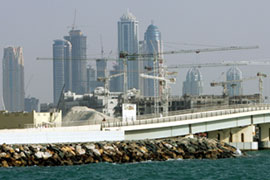Dubai debt triggers investor panic
Asian and European banks distance themselves from Dubai World fearing debt default.

European stocks fell to lows not seen since May and bonds jumped after the restructuring was announced.
Dubai, part of the oil-exporting United Arab Emirates, said on Wednesday it would ask Dubai World creditors and Nakheel to agree to a standstill on billions of dollars of debt as a first step towards restructuring.
Dubai World, the conglomerate that led the emirate’s expansion, had $59bn of liabilities as of August, most of Dubai’s total debt of $80bn.
Nakheel was the builder of three palm-shaped islands off Dubai.
‘Considerable challenges’
Alia Moubayed, a senior economist at Barclays Capital in London and author of the Dubai Debt Problem report, said the “challenges Dubai is facing are considerable”.
“The sources of financing, however, at this stage are … the extent of the Abu Dhabi support that’s likely to come through,” she told Al Jazeera.
| in Video | |||||
|
Moubayed said resolving the cirisis would also depend on the “the ability of the Dubai government to come up with a clear plan in terms of what it wants to do to restructure its institutions and the debts related to that”.
“Dubai has been successful in rolling over a significant amount of debt – around $6bn to $10bn over the last few months and has been able to raise another $2bn,” she said.
“The question of course – and this is where the vulnerability lies – is: How will it be able to refinance another $25bn to $30bn, or even more that’s maturing in the next 18 months to two years?”
But Brian Caplen, editor of The Banker magazine, said that Dubai’s debt default was far smaller than the losses seen in the wake of the US sub-prime mortgage crisis in 2007.
“They say that European banks hold about $40bn worth of exposure to Dubai – about half the total debts of the emirate. But I think you have to put that in context,” he said.
| FROM THE BLOGS | |||
|
“Don’t forget the exposure to toxic assests during [the sub-prime] mortgage crisis was $1,000bn. So, this is actually quite small in the context of the world crisis that we have seen over the last year or so.”
India’s central bank governor said on Friday an assessment of the impact of Dubai’s debt problems was needed before deciding on a response.
“We should not react to instant news like this. One lesson of the crisis is that we must study the developments, and I think we must measure the extent of the problem there and how it impacts India,” Duvvuri Subbarao said in Hyderabad, India.
“I have requested my officials to study this and, if necessary, we will certainly communicate in the public about what the implications likely are.”
Veritable default
The cost of insuring Dubai’s debt surged on Thursday following the government’s announcement.
Dubai’s five-year credit default swaps – the insurance against its credit risk – rose to almost 470 basis points, a rise of 30 base points on the previous session’s close, CMA Datavision, a London-based market analysis group, said.
 |
| Nakheel is responsible for the construction of the artificial island of Palm Jumeriah [AFP] |
“Dubai isn’t doing risk appetite any favours at all and the markets remain in a vulnerable state of mind,” Russell Jones, the head of fixed-income and currency research in London at RBC Capital Markets, told the Bloomberg website.
“We’re still in an environment where we’re vulnerable to financial shocks of any sort and this is one of those,” he said.
Caplen, of The Banker, said that while Dubai has some tough challenges in the short term, it can recover with sufficient planning.
“It is going to be very tough for Dubai in the next six months to a year, that’s for sure. What the markets have been reacting to is the shock and the mystery; they hate being put into this position of not knowing,” he said.
“But I think that when the dust has settled it will be possible for Dubai to put together a credible restructing plan and, slowly, it will be able to go back to its strategy. Which I think is the right one – to diversify away from oil towards tourism and a financial and trading centre. Those are the strengths.”

